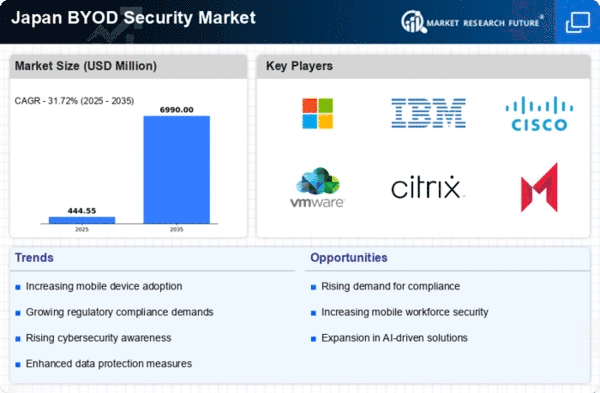Rising Cyber Threats
The byod security market in Japan is experiencing heightened demand due to the increasing frequency and sophistication of cyber threats. Organizations are recognizing the necessity to protect sensitive data accessed through personal devices. In 2025, it is estimated that cybercrime could cost businesses globally over $10 trillion annually, prompting Japanese companies to invest in robust security measures. This trend indicates a growing awareness of the vulnerabilities associated with BYOD policies, leading to a surge in the adoption of security solutions tailored for personal devices. As a result, the byod security market is likely to expand as businesses seek to mitigate risks and ensure compliance with data protection regulations.
Shift to Remote Work Culture
The ongoing shift towards remote work in Japan has significantly influenced the BYOD security market.. With more employees accessing corporate networks from personal devices, the need for effective security solutions has become paramount. According to recent data, approximately 60% of Japanese companies have adopted flexible work arrangements, which necessitates stringent security protocols to safeguard sensitive information. This trend suggests that organizations are increasingly investing in technologies that secure personal devices, thereby driving growth in the byod security market. The emphasis on remote work is likely to persist, further solidifying the demand for comprehensive security strategies.
Increased Mobile Device Usage
The proliferation of mobile devices in Japan is a key driver for the BYOD security market.. As of 2025, it is projected that over 80% of the Japanese population will own a smartphone, leading to a significant rise in the use of personal devices for work-related tasks. This trend presents both opportunities and challenges for organizations, as they must implement effective security measures to protect corporate data accessed via these devices. The growing reliance on mobile technology indicates a pressing need for solutions that address the unique security challenges posed by BYOD environments, thereby propelling the byod security market forward.
Growing Awareness of Data Privacy
The increasing awareness of data privacy among consumers and businesses in Japan is significantly impacting the BYOD security market.. As individuals become more conscious of their personal information and its potential misuse, organizations are compelled to enhance their security measures. Surveys indicate that over 70% of Japanese consumers express concern about data privacy, prompting businesses to adopt stringent security protocols for personal devices. This heightened awareness is likely to drive demand for innovative security solutions that protect sensitive data, thereby fostering growth in the byod security market. Companies that prioritize data privacy may gain a competitive edge in this evolving landscape.
Evolving Data Protection Regulations
Japan's evolving data protection regulations are shaping the landscape of the byod security market. The introduction of stricter compliance requirements necessitates that organizations adopt comprehensive security measures to protect personal and corporate data. In 2025, it is anticipated that compliance costs could rise by 30% for businesses failing to meet these regulations. This regulatory environment compels companies to invest in advanced security solutions that align with legal standards, thereby driving growth in the byod security market. Organizations are increasingly prioritizing compliance as a critical component of their security strategies, which may lead to a more robust market.
















